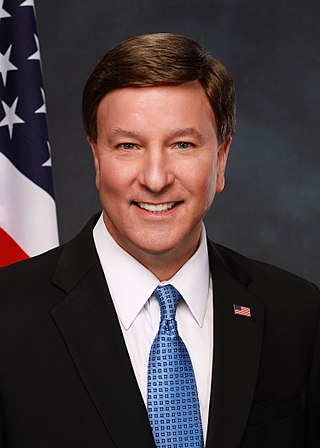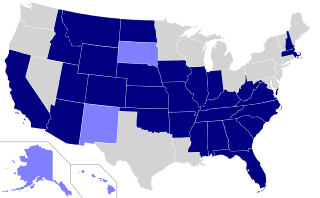
United Nations Security Council Resolution 242 (S/RES/242) was adopted unanimously by the UN Security Council on November 22, 1967, in the aftermath of the Six-Day War. It was adopted under Chapter VI of the UN Charter. The resolution was sponsored by British ambassador Lord Caradon and was one of five drafts under consideration.

The Bush Doctrine refers to multiple interrelated foreign policy principles of the 43rd President of the United States, George W. Bush. These principles include unilateralism, preemptive war, and regime change.

This article describes the positions of world governments before the actual initiation of the 2003 invasion of Iraq, and not their current positions as they may have changed since then.

Significant opposition to the Iraq War occurred worldwide, both before and during the initial 2003 invasion of Iraq by a United States-led coalition, and throughout the subsequent occupation. People and groups opposing the war include the governments of many nations which did not take part in the invasion, and significant sections of the populace in those that did.
The United States is a charter member of the United Nations and one of five permanent members of the UN Security Council.

Michael Dennis Rogers is an American lawyer and politician serving as the U.S. representative for Alabama's 3rd congressional district since 2003. He is a member of the Republican Party of Alabama. Since 2021, he has served as the Ranking Member of the House Armed Services Committee. From 2019 to 2021, he served as the Ranking Member of the House Homeland Security Committee.

Barbara Jean Lee is an American politician serving as the U.S. representative for California's 13th congressional district. Now in her 12th term, Lee has served since 1998, and is a member of the Democratic Party. The district, numbered as the 9th district from 1998 to 2013, is based in Oakland and covers most of the northern part of Alameda County. According to the Cook Partisan Voting Index, it is one of the nation's most Democratic districts, with a rating of D+40.

Edward Randall Royce is an American politician who served as a member of the United States House of Representatives from California from 1993 to 2019. A member of the Republican Party, Royce served as Chairman of the United States House Committee on Foreign Affairs from 2013 to 2019. He previously served as a member of the California Senate from 1982 to 1993.

The main event by far shaping the foreign policy of the United States during the presidency of George W. Bush (2001–2009) was the 9/11 terrorist attacks against the United States on September 11, 2001, and the subsequent war on terror. There was massive domestic and international support for destroying the attackers. With UN approval, US and NATO forces quickly invaded the attackers' base in Afghanistan and drove them out and the Taliban government that harbored them. It was the start of a 20-year quagmire that finally ended in failure with the withdrawal of United States troops from Afghanistan.

The withdrawal of the United States troops from Iraq began in December 2007 with the end of the Iraq War troop surge of 2007 and was mostly completed by December 2011, bringing an end to the Iraq War. The number of U.S. military forces in Iraq peaked at 170,300 in November 2007.

The Taiwan Security Enhancement Act was a US Congressional bill which never became law. It was passed by one of the Houses of the U.S. Congress, the House of Representatives, on February 1, 2000, by a vote of 341 to 70. It envisaged greater United States military support of the Republic of China/Taiwan, including training and equipment. It also contemplated establishing direct military communication lines between the United States and Taiwan. It was never approved by the U.S. Senate or signed into law by the U.S. president.
Withdrawal from the United Nations by member states is not provided for in the United Nations Charter. According to the Government Information Office of Taiwan :
The American Sovereignty Restoration Act is a bill that has been introduced by various members of Congress, proposing withdrawal from the United Nations. The most recent iteration is H.R.7806, the American Sovereignty Restoration Act of 2022, introduced by Rep. Mike D. Rogers.
Opposition to the War in Afghanistan (2001–2021) stemmed from numerous factors, including the view that the United States invasion of Afghanistan was illegal under international law and constituted an unjustified aggression, the view that the continued military presence constituted a foreign military occupation, the view that the war did little to prevent terrorism but increased its likelihood, and views on the involvement of geo-political and corporate interests. Also giving rise to opposition to the war were civilian casualties, the cost to taxpayers, and the length of the war to date.

The states parties to the Rome Statute of the International Criminal Court are those sovereign states that have ratified, or have otherwise become party to, the Rome Statute of the International Criminal Court. The Rome Statute is the treaty that established the International Criminal Court, an international court that has jurisdiction over certain international crimes, including genocide, crimes against humanity, and war crimes that are committed by nationals of states parties or within the territory of states parties. States parties are legally obligated to co-operate with the Court when it requires, such as in arresting and transferring indicted persons or providing access to evidence and witnesses. States parties are entitled to participate and vote in proceedings of the Assembly of States Parties, which is the Court's governing body. Such proceedings include the election of such officials as judges and the Prosecutor, the approval of the Court's budget, and the adoption of amendments to the Rome Statute.

The Jerusalem Embassy Act of 1995 is a public law of the United States passed by the post-Republican Revolution 104th Congress on October 23, 1995. The proposed law was adopted by the Senate (93–5), and the House (374–37). The Act became law without a presidential signature on November 8, 1995.

George H. W. Bush's tenure as the 41st president of the United States began with his inauguration on January 20, 1989, and ended on January 20, 1993. Bush was a Republican from Texas and the incumbent vice president for two terms under president Ronald Reagan. Bush took office following a victory over Democrat nominee Michael Dukakis in the 1988 presidential election. His presidency ended following his defeat in the 1992 presidential election by Democrat Bill Clinton. Bush, the 41st president, was the father of the 43rd president, George W. Bush.

The English Language Unity Act was first introduced in 2005. It hoped to establish English as the official language of the federal government of the United States. If enacted it would require that all official functions and proceedings of federal and state government be conducted in English. It would also require that applicants for naturalization be tested on their ability to read and generally understand the English language. They would be tested on the laws of the United States as well as other important documents that relate to the law, including the Declaration of Independence and Constitution. It would also require that all naturalization ceremonies be conducted in English. If a person became injured because of violations of this act, they would be able to file suit in court. Before this act could be considered by the House of Representatives it had to be approved by the House Judiciary, and Education and the Workforce Committees.

Michael Shumway Lee is an American lawyer and politician serving as the senior United States senator from Utah. A Republican, Lee has been in the Senate since 2011.
The domestic reactions in the United States after the 2011 military intervention in Libya ranged from criticism to support. Unlike the revolutions in Tunisia and Egypt, which were carried out largely without external intervention, the brutal reaction of the Gaddafi regime to the protests that began in January and February 2011 quickly made it clear that the Libyan opposition forces would not be able to achieve political progress or to overthrow their government by themselves. In light of ongoing serious human rights violations, the United Nations Security Council established a no-fly zone over Libya and authorized the member states of the UN to take all necessary measures to protect civilians and civilian populated areas under threat of attack. Two days later, a coalition of states—including the United States, the United Kingdom, and France—began to carry out air strikes against military targets in Libya. By the end of March 2011, NATO had taken over the international military operation in Libya. With the support of NATO, the insurgents successively took power in Libya, gaining control over the capital, Tripoli, in August and over Sirte, the last city held by the Gaddafi regime, in October 2011. During the fights over Sirte, Gaddafi was killed. With the insurgents taking control over most of the country and being recognized as the legitimate (transitional) government of Libya by much of the international community, a change in the Libyan regime has taken place.














